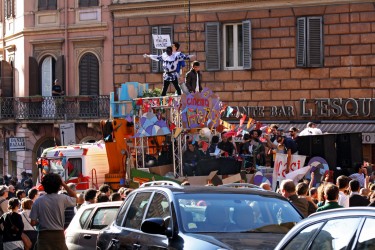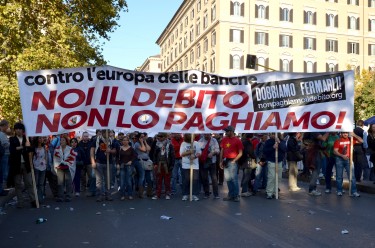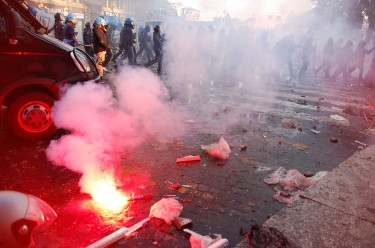This post is part of our special coverage #Occupy Worldwide.
Inspired by the “Occupy Wall Street” movement in New York and by the Spanish “Indignados”, citizens in 951 cities and 82 countries across the world took to the streets on October 15, 2011, to protest against the stranglehold on the economy of the global financial and political powers to the benefit of the few, calling for real democracy and a re-thinking of capitalism under the slogan “united for global change”.
Tens of thousands of people from across Italy gathered in Rome on Saturday 15 October, in support of the global movement.
Oct 15 in Italy
Whilst demonstrations were relatively peaceful elsewhere in Italy, the march towards Piazza San Giovanni in Rome turned into urban conflict as an estimated couple of hundred individuals (“black-blocks”) burned vehicles, smashed windows, and hurled rocks and bottles at police, who responded with tear gas and water cannons.
Many peaceful demonstrators were also caught up in the violence as chaos spread on the streets of Rome, with over 130 people injured (mostly police officers) and 12 arrests.
As the riots stole headlines around the world, on the Internet people have been expressing their frustration at the way the motivations behind the protests have been overshadowed by the violence.
@GianMarioBH [it] tweeted:
Non sono ne dalla parte dei celerini ne da quella dei BB, sono tra chi si è stufato di doversi svegliare vergognandosi del suo paese #15ott
Whilst @zimok [it] commented on the media’s thirst for sensationalism:
Tutti che correvano, assatanati di violenza e vandalismo. chi? i giornalisti, gli inviati, i media. alla prima auto bruciata. #15ott
Blogging on independent newspaper Il Fatto Quotidiano, Sandro Ruotolo asks why police were unable to prevent the violence, and writes [it]:
Ieri a Roma era tutto organizzato fin nei minimi dettagli. C’erano due piazze in piazza. Il movimento democratico che, come nel resto del mondo, voleva lanciare la sua sfida al capitalismo finanziario in modo pacifico e indignato sconfitto da poche decine di irriducibili violenti il cui unico scopo era “combattere”. Nessuno potrà accomunare gli indignati ai violenti. Ci sono stati episodi concreti di condanna se è vero che tre Black bloc sono stati consegnati alle forze dell’ordine. Un gesto importante.
Others like Alessandro from the communist collective Militant, think that such a distinction between the “good” and the “bad” protesters will not help us understand [it] yesterday’s events:
La rabbia si è espressa, ragioniamo sul domani, su come rendere incanalabile questa rabbia verso un processo politico alternativo a questo sistema. No reiterando i soliti clichè fra i bravi manifestanti pacifici e i cattivi (o gli infiltrati) manifestanti col cappuccio in testa.
Some have criticised the police for not being able to prevent the violence, and for focusing on protecting institutional and political buildings rather than people. Others, like Christian Mazzoni in a comment on Il Fatto Quotidiano [it] go even beyond that:
Perchè non sono stati fermati prima? Semplice, perchè fanno comodo alla classe dirigente. Oggi la nostra classe dirigente avrebbe dovuto rendere il conto delle politiche sbagliate nei confronti delle nuove generazioni, ma ha avuto gioco facile nello sviare l’argomento parlando solo degli episodi di teppismo.
Context of violence
The violence comes only a day after Berlusconi faced a confidence vote in parliament, won by an extremely narrow margin of 316 votes to 301. A few weeks ago, the rating agency Standard & Poor downgraded Italy’s credit rating, largely due to what they perceived as the inability of the Italian government to implement economic measures to combat the country’s sovereign debt crisis.
As the third largest economy in the Eurozone, it is feared that if Italy’s debt should spiral out of control, it could have disastrous consequences on the European economy, and the European Central Bank is putting pressure on the government to implement measures including privatisations and deregulation of the job market.
Protests and sit-ins have been staged across the country this week by a group who call themselves the “rebel dragons” (Draghi Ribelli), including one in front of the Italian Central Bank, organised on Twitter under the hashtags #occupiamobancaditalia and #occupiamobankitalia. Earlier this week, the group wrote an open letter [it] to the Italian President Giorgio Napolitano, an appeal not to abide to the European Central Bank’s wishes on how Italy should deal with the financial crisis:
La questione generazionale è semplice: c’è una generazione esclusa dai diritti e dal benessere, che oggi campa grazie al welfare familiare, e sulla quale si sta scaricando tutto il peso della crisi […] Caro Presidente, garantire e difendere la Costituzione oggi, vuol dire rifiutarsi di pagare il debito, così come consigliano diversi premi Nobel per l’economia; vuol dire partire dai ventisette milioni di italiani che hanno votato ai referendum contro le privatizzazioni e in difesa dell’acqua bene comune; vuol dire partire dalle mobilitazioni giovanili e studentesche che da diversi anni, inascoltate e respinte, hanno preteso di cambiare dal basso la scuola e l’università, chiedendo risorse e democrazia; vuol dire partire dalla domanda diffusa nel Paese di un nuovo sistema di garanzie, che tenga conto delle differenze generazionali, ma che, soprattutto, non metta le generazioni l’una contro l’altra: così, in primo luogo, si tiene unita l’Italia!
On their blog Giap [it], a member of the writers collective Wu Ming, writing under the pseudonym Wu Ming 1, also addresses the question of a “lost generation” in relation to the violence in Rome:
Rendiamoci conto di una cosa: non ci sarà mai più una “manifestazione nazionale di movimento” che non includa quel che abbiamo visto oggi. Quando si sceglierà quel format, si acquisterà sempre il “pacchetto completo”. C’è una rabbia sociale talmente indurita che non la scalfisce un martello pneumatico, e due generazioni allo sbando completo, derubate di futuro e furibonde, tutte pars destruens, prive di fiducia nei confronti più o meno di chiunque.
The format of the protest in Italy was discussed at length and criticised on the web. @barbapreta tweeted:
What went wrong with occupy movement in Italy? It bluntly ignored the experiences of other occupy movements in organizing protests #15ott
On the website of the publishing house Apogeo Online, sociology professor Giovanni Boccia Artieri reflects on the meaning of taking to the streets [it] in the era of digital communication:
Le masse del Novecento non sono le moltitudini di oggi. Non abbiamo a che fare con il movimento organizzato della classe operaia, con le grandi organizzazioni politiche. Gli indignati sono una moltitudine che racchiude sotto uno stesso termine ombrello una molteplicità di differenze, anche estreme. Non è possibile il principio di rappresentatività interna, non c’è un leader del movimento da intervistare. [..]
La logica e i linguaggi della rete ce lo hanno insegnato nel nostro avere imparato ad abitare il web, ad auto organizzarci, a costruire informazione quotidianamente e a condividerla, ad auto rappresentare le nostre istanze e le nostre opinioni. Certo, non tutti e con tutti i distinguo che volete. Ma quello che la rete ci ha insegnato, ad esempio, è creare un nuovo rapporto fra aggregazione collettiva e delocalizzazione. Non c’è bisogno di essere tutti nello stesso luogo per esprimere contemporaneamente la stessa opinione.”
The masses of the twentieth century were different from today’s “multitudes”. We’re not dealing with the organised movement of the working class, or with large political organisations. “Indignants” is an umbrella term for a multitude of experiences and ideas, often extremely different. The principle of representation does not apply; there isn’t a leader to be interviewed. […]
The nature and language of the Internet have taught us this as we were learning to use the web, to self-organise, to produce and share information on a daily basis, to speak out for our own grievances and opinions. Yes, not everyone and not without exceptions. […] But the Internet has taught us, for instance, to establish new dynamics between mass mobilisation and de-localisation. We don’t all have to be in the same physical space to express a shared opinion.

Artists from the occupied Cinema Palazzo parade at Saturday's march in Rome, before it turned violent.
On the topic of marching as a form of protest, Repubblica journalist Vittorio Zambardino [it] wrote on his Facebook page:
E se fosse venuto il tempo di dire addio al corteo come forma di protesta? Alla prossima perché non vi sedete in una piazza e cantate? O qualche altra cosa gandiana e non violenta? Lo sciopero del sale dell'indignato. Spremetevi le cervella o le conseguenze della guerriglia ci travolgeranno tutti.
Finally, blogger and journalist Gennaro Carotenuto [it] writes about future social engagement, drawing a parallel between what happened on Saturday in Rome and the London riots of some months ago:
Ma dopo di ieri è chiaro che la scorciatoia di un presidio, l’occupazione di una scuola o un’università, i 140 caratteri di twitter servano a molte cose ma non sostituiscono il lavoro sociale quotidiano, il dialogo con i dannati delle periferie, spesso così disperati da farsi male e far male con la violenza di sabato a Roma.
This post is part of our special coverage #Occupy Worldwide.









3 comments